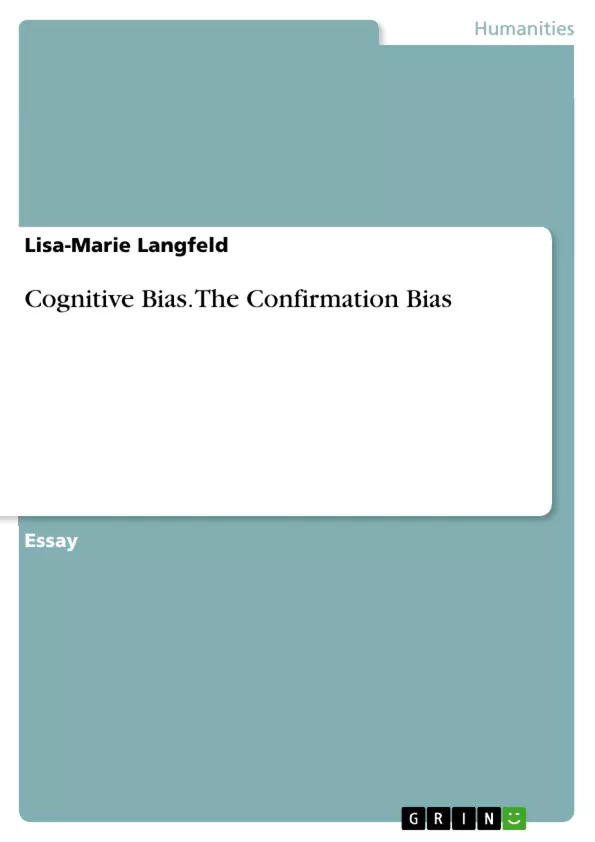The term ‘cognitive bias’, also known as ‘psychological bias’, was first mentioned by Amos Tversky and Daniel Kahneman at the beginning of the 1970s. It describes a phenomenon which happens uncountable times a day within the human brain: making decisions and judging issues although facing various limitations, such as, information or time. By using a heuristic tool one reaches a satisfying conclusion (cf. Wilke and Mata, 2012)
The paper on hand focuses on the confirmation bias.
Inhaltsverzeichnis (Table of Contents)
- Cognitive Bias - The Confirmation Bias
- Defining Confirmation Bias
- Examples of Confirmation Bias
- Overcoming Confirmation Bias
Zielsetzung und Themenschwerpunkte (Objectives and Key Themes)
This paper explores the concept of confirmation bias, a cognitive phenomenon that influences how people interpret and process information. It aims to provide a comprehensive understanding of confirmation bias, its implications, and strategies for mitigating its impact.
- Definition and origins of confirmation bias
- Examples of confirmation bias in various contexts
- Consequences of confirmation bias
- Strategies for overcoming confirmation bias
- The impact of confirmation bias on decision-making
Zusammenfassung der Kapitel (Chapter Summaries)
The paper begins by introducing the concept of confirmation bias and providing historical context. It discusses the phenomenon of confirmation bias as a psychological bias affecting decision-making, with numerous examples from various fields, including law, business, and everyday life.
The paper further delves into the consequences of confirmation bias, highlighting its potential to lead to inaccurate judgments and biased conclusions. It explores the impact of confirmation bias on various aspects of human behavior, including information seeking, interpretation, and recall.
Schlüsselwörter (Keywords)
Key terms and concepts addressed in this paper include cognitive bias, psychological bias, confirmation bias, 'myside' bias, heuristics, decision-making, information processing, information seeking, interpretation, recall, and bias mitigation strategies.
Frequently Asked Questions
What is a cognitive bias?
A cognitive bias is a psychological phenomenon where the brain makes systematic errors in judgment or decision-making, often due to information or time limitations.
What specifically is the "Confirmation Bias"?
It is the tendency of people to search for, interpret, and remember information in a way that confirms their preexisting beliefs or hypotheses.
Who pioneered the term "cognitive bias"?
The term was first introduced by psychologists Amos Tversky and Daniel Kahneman in the early 1970s.
What are the consequences of confirmation bias in real life?
It can lead to biased decision-making in fields such as law, business, and medicine, often resulting in inaccurate judgments and the ignoring of contradictory evidence.
How can one overcome confirmation bias?
Strategies include actively seeking out opposing viewpoints, using structured decision-making tools, and practicing critical self-reflection.
- Quote paper
- Lisa-Marie Langfeld (Author), 2015, Cognitive Bias. The Confirmation Bias, Munich, GRIN Verlag, https://www.grin.com/document/535910



